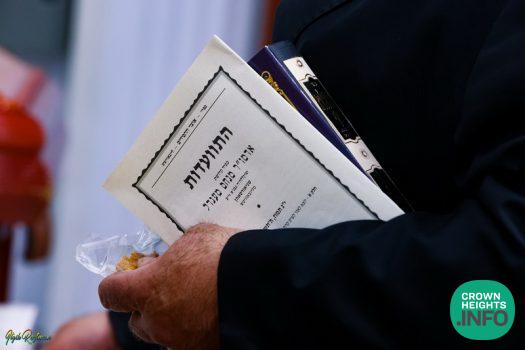
Weekly Dvar Torah: The Superior Quality of Moshiach and the Quality of Golus
“In the Sichos of the Rebbe Rashab, there is a profound perspective on our current state of exile and the future arrival of Moshiach. He explains that when Moshiach comes, we will look back at our days of exile with a sense of longing. This future reflection will bring to light our past neglect of Avoda (spiritual work) and the deep pain stemming from missed opportunities in our service to G-d during these days. This period of exile is not just a time of waiting but a crucial phase of preparation for the coming of Moshiach.” (Hayom Yom 3 Menachem Av)
“The essence of Moshiach’s unique quality lies in his humility. Despite being the epitome of greatness—capable of teaching Torah to the Patriarchs and to Moshe Rabbeinu—Moshiach will embody the ultimate humility and self-nullification. His role will include teaching even the simplest of individuals, demonstrating that his greatness is coupled with profound modesty.” (Hayom Yom 1 Menachem Av)
The daily Hayom Yom provides pearls of wisdom that are both powerful and energizing. These insights help us navigate the current period, where we simultaneously mourn the prolonged bitterness of Golus (exile) while preparing for and celebrating the anticipated revelation of Moshiach, who will end this Golus.
An illustrative story from history highlights this sentiment. During Tisha B’Av, as Napoleon entered a synagogue where Jews were reciting the Lamentations with tears, he inquired about their sorrow. When informed that it was over the destruction of the Temple in Jerusalem 1700 years prior, Napoleon responded with a belief in their eventual return, stating, “A people that cries over their exile of 1700 years will certainly return home one day.” This story underscores the hope that, while we mourn past destruction, we eagerly anticipate the rebuilding of the Beis Hamikdash and the complete redemption.
In a Maamar, the Frierdiker Rebbe provides insight into why Moshiach values the simple folk. The Talmud recounts a debate among the sages about whether the study of Torah or the active observance of Mitzvos is superior. Rabi Akiva argued that Torah study is greater, as it represents an intellectual exercise in serving G-d, which surpasses mere physical actions. Rabi Tarfon, however, maintained that action is superior because it represents self-subjugation to G-d’s will. Ultimately, the consensus was that Torah study is greater because it leads to action. This debate highlights the intrinsic value of action, although the sages could not definitively decide which was superior on its own merits.
However, it is taught that in the future, when Moshiach comes, the role of action will become especially prominent. This is because action embodies a person’s self-nullification and subjugation to G-d, which is ultimately what G-d desires from us. Unlike study, which has limits to its depth and extent, self-nullification is boundless, reflecting a profound belief that transcends limitations. When Moshiach arrives, this ideal of limitless self-effacement will be fully revealed.
This explains why Moshiach will be characterized by humility. Moshiach will deeply appreciate the value of humility and self-effacement, recognizing that the simplicity and earnestness of uneducated, simple folk reflect a genuine selflessness. While scholars may feel a sense of self-importance due to their learning, the simple folk’s approach is marked by a lack of self-assertion. Moshiach will identify with the modest and humble, and this recognition of the value of simplicity will be his superior greatness.
In one Hayom Yom, the Rebbe teaches us about the value of Golus. He reveals that the true appreciation of the exile’s significance will only come with Moshiach’s arrival. We will then fully recognize the value of the long and bitter Golus and even yearn for it due to the missed opportunities that will no longer be available once Moshiach arrives. The Rebbe imparts this knowledge to empower us, urging us not to despair. There is a crucial mission to fulfill now, in Golus, which will not be possible once Moshiach arrives. It is essential not to waste this opportunity, as Moshiach’s arrival will bring a time when these opportunities are gone.
Why is it important to work hard during Golus? The Rebbe explains that true merit comes not from serving G-d in times of revealed goodness, rather from overcoming challenges and performing G-d’s will amidst darkness and concealment. This is why G-d created the world, and our efforts in Golus, fulfill this Divine mission. By doing so, we prepare ourselves for the ultimate G-dly reward that will come with the glorious days of redemption. However, we will inevitably look back and see all the missed opportunities.
Some might become complacent, thinking that with Moshiach’s coming, everything will be resolved, and thus, question the need for continued effort. The Rebbe teaches us that Moshiach’s superior quality will be his humility. Despite his role as the world’s leader and teacher to such giants as the Patriarchs and Moshe Rabbeinu, Moshiach will not consider it beneath him to teach even the simplest folk. This humility reflects that the earnest, G-d-fearing Jews, through their simplicity and self-sacrifice, will play a crucial role in bringing Moshiach into actuality.
The teachings of the Rebbe and the wisdom found in Hayom Yom encourage us to value our current state of Golus as a period of preparation and opportunity. While we mourn the past and anticipate Moshiach’s coming, we are called to embrace our mission with humility and dedication. By doing so, we contribute to the ultimate redemption and the realization of Moshiach’s unique qualities, recognizing that the true greatness of Moshiach will be found in his humility and the acknowledgment of the value of simplicity.
Have a Shabbos of Humility Filled with Action,
Gut Shabbos
Rabbi Yosef Katzman











